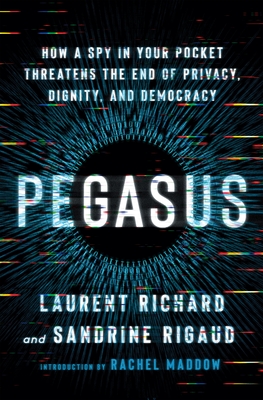What do you think?
Rate this book


336 pages, Hardcover
First published January 17, 2023

"The cybersurveillance system the company created and continually updates and upgrades for its sixty-plus clients in more than forty different countries has made the world a much safer place, says NSO. Tens of thousands of lives have been saved, they say, because terrorists, criminals, and pedophiles (pedophiles is a big company talking point the last few years) can be spied on and stopped before they act. The numbers are impossible to verify, but the way NSO describes it, the upsides of Pegasus, used within legal and ethical boundaries, are pretty much inarguable. Who doesn’t want to stop pedophiles? Or terrorists? Who could be against it?"
"THIS BOOK IS the behind-the-scenes story of the Pegasus Project, the investigation into the meaning of the leaked data, as told by Laurent Richard and Sandrine Rigaud of Forbidden Stories, the two journalists who got access to the list of fifty thousand phones. With the list in hand, they gathered and coordinated an international collaboration of more than eighty investigative journalists from seventeen media organizations across four continents, eleven time zones, and about eight separate languages. “They held this thing together miraculously,” says an editor from the Guardian, one of the partners in the Pegasus Project. “We’ve got, like, maybe six hundred journalists. The Washington Post is maybe twice the size. And to think that a small nonprofit in Paris, with just a handful of people working for it, managed to convene a global alliance of media organizations and take on not just one of the most powerful cybersurveillance companies in the world but some of the most repressive and authoritarian governments in the world, that is impressive.''”
"...In the daily back-and-forth of American news and politics—my wheelhouse—it is rare indeed to come across a news story that is both a thriller and of real catastrophic importance. Regular civilians being targeted with military-grade surveillance weapons—against their will, against their knowledge, and with no recourse—is a dystopian future we really are careening toward if we don’t understand this threat and move to stop it. The Pegasus Project saga not only shows us how to stop it; it’s an edge-of-your seat procedural about the heroes who found this dragon and then set out to slay it."
"WHERE’S YOUR PHONE right now? That little device in your pocket likely operates as your personal calendar, your map and atlas, your post office, your telephone, your scratchpad, your camera—basically as your trusted confidant. Matthew Noah Smith, a professor of moral and political nphilosophy, wrote in 2016 that a mobile phone “is an extension of the mind.… There is simply no principled distinction between the processes occurring in the meaty glob in your cranium and the processes occurring in the little silicon, metal, and glass block that is your iPhone. The solid-state drive storing photos in the phone are your memories in the same way that certain groups of neurons storing images in your brain are memories. Our minds extend beyond our heads and into our phones.”
Professor Smith was making the case back then for a zone of privacy that extended to our mobile phone. If the state has no right to access the thoughts in our head, why should it have the right to access the pieces of our thoughts that we keep in our mobile phone? We tell our cell phones almost anything these days, even things we aren’t cognizant of telling it,b and use it as the conduit to offer the most intimate glimpses of ourselves. (See sexting.) If you believe your privacy is being secured by encryption, please read this book, and consider the fifty thousand people on that horror show list, who unbeknownst to them were targeted to unwillingly share every single thing that passed through their phones with people who only had to pay for the privilege.
That list of fifty thousand was just our first keyhole view of the crime scene. If they could do it for fifty thousand, doesn’t that mean they could do it for five hundred thousand? Five million? Fifty million? Where is the limit, and who is going to draw that line? Who is going to deliver us from this worldwide Orwellian nightmare? Because it turns out you don’t have to be married to the emir of anything to find your every thought, every footstep, every word recorded and tracked from afar. Turns out you just need to have a phone, and a powerful enemy somewhere. Who among us is exempt from those conditions?
Where did you say your phone is right now?"